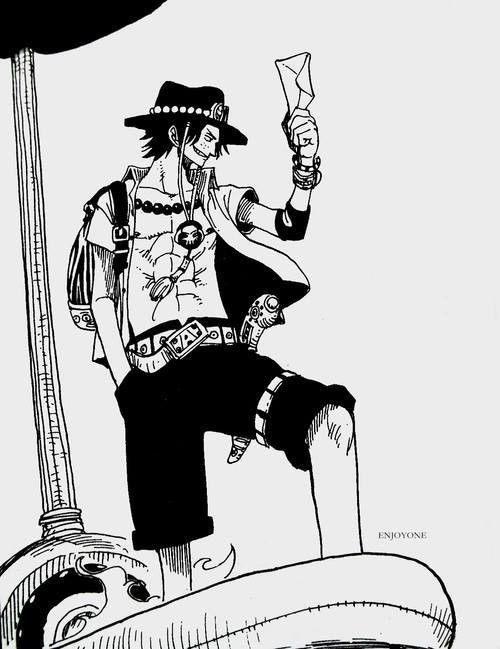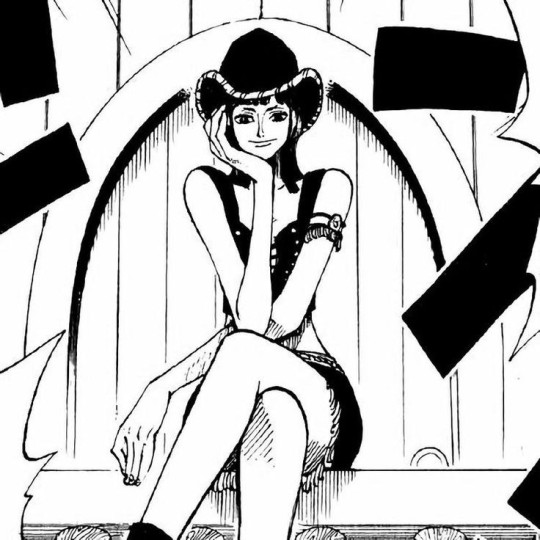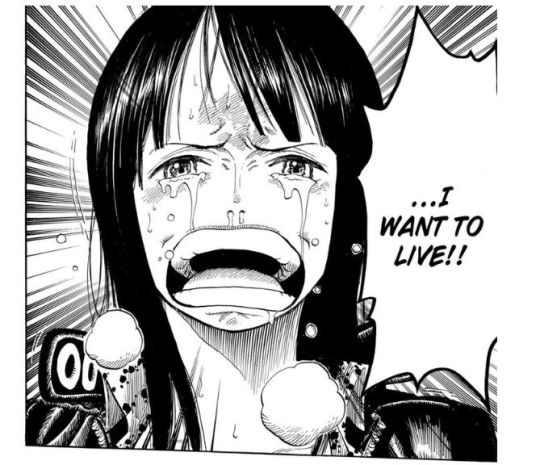#sometimes im like ok wow oda did such a good job and other times im like *pointing* misogynist
Explore tagged Tumblr posts
Text
Plot Foils: On Ace, Robin, Marineford and Enies Lobby


Thought I'd put together a short lil meta on how Ace and Robin in the arcs of Marineford and Enies Lobby mirror each other within the plot, and what that thematically implies since I can't stop thinking about it and since any tradgedies immediately trigger my trap card of Write Meta Frantically. Also, note that there are spoilers for up to the time skip.
First, I'll start with the similarities between both Ace and Robin, and the arcs of Enies Lobby and Marineford, which can be laid out on the flow chart chart below, which I'll go into detail below, before digging into the themantic implications:
Parent figure involved with poneglyphs
mass violence by government in response to threat
survival of the character but widespread demonization of them
struggle with survivors guilt and suicidal inclinations
Acceptance into a found family, and who they are no matter their demonization
testing of the acceptance by capture of the World Government
resounding yes and declaration of War against the World Government by found family
do you want to live?
rescue/failure
1 and 2: Parent Figure and Mass Violence
Both Ace and Robin are survivors of violence from the government at a young age; Robin with the genocide of Ohara, and Ace with the hunting down and killing of babies in Baterilla after the execution of Gol D Roger. This violence by the world government is a response to both their parents being involved with poneglyphs, which threatens the power of the government (I also understand that Gol D Roger in his status of King of the Pirates was it's own impetus... but that's also intertwined with the poneglyphs in a way). Interestingly, both the parent figures desperately try to protect their children through denying or hiding the children away from the government as a form of protective love.
3 and 4: demonization, survivors guilt and suicidal inclinations
For both of them, their parents (or people's) demonization is transferred to their own lives. Robin quite literally becoming called a demon child and scorned by the world, while Ace is more round-about-ly called a demon child when talked about theoretically. Actually, even Dadan, who does love him, at one point calls him the devil's spawn (or some other variation, I can't remember exactly). As a result of the violence occurred by the government they both carry the feelings of survivor's guilt; and with their demonization, this guilt over being mere alive is compounded as the world repeatedly tells them that they should not exist. As a result, they both struggle with their own existence and suicidal ideology, unsure of what the world really tells them is true especially as both their parents are dead and cannot validate their existence. Also, as they are demonized, they are isolated from society, and other forms of love and acceptence from adults which could reassure them against such internalization of their demonization aren't really forthcoming. Although Ace has Luffy and Sabo for a good chunk of his childhood, and so is not entirely alone and rejected by everyone, he still clearly struggles with being alive and being accepted by others, especially adults and parental figures; this evidenced through his anger issues and his talk with Garp in which he asks if he should have been born (gonna fucking strangle Garp for being like 'Well I don't know' to a fucking KID who is asking if he should be alive or not). Robin on the other hand, is clearly alone and acutely lonely the majority of her life as she has to continue to be on the run, as she has a bounty placed on her head, and even kind people cannot accept her for long without the threat of the law.

ID: Ace asking Garp as a kid "would it have been better if I was never born?"
5: Acceptance
For both of them, their internalized suicidal thoughts and doubts becomes suppressed when they become incorporated into a family that accepts them wholeheartedly, breaking the stigma of their demonization. To Robin, this occurs when she begins to sail with the Strawhats who accepts her pretty quickly, not caring about her being a 'demon' in the eyes of the general populace and forgiving her for her previous transgressions against them; accepting her for who she truly is for the first time in her life since her very early childhood. Luffy, of course, I would bet sees the similarities between her and Ace; something that we the audience during the first read/watch though are oblivious too, but contextualized later make immense sense for why he has such strong feelings about Robin and suicidal characters. But I digress. For Ace this becomes suppressed when he is accepted into the family of Whitebeard; who is the first adult to not care about who his father is and still accepts him whole heartedly, to the point of seeing him as his own son. Again, Whitebeard and his family, like with the Strawhats and Robin, forgive Ace for his attempts of violence against them. This acceptence of them even spite their demonization, even in spite of them previously attempting to hurt or actually physically hurting the crew, allows them to begin to undo their internalized suicidal ideologies.
6, 7 and 8: capture, declaration of war and confessions
This acceptance by their found families ends up being tested as the World Government gets involved; for Robin in the Enies Lobby arc and with Ace, the Marineford arc as they are both captured as a result of them caring about their found families. For Ace, it is guilt over not recognizing Teach's dangerousness who was in his division, and the need to avenge his brother; for Robin, it is to ensure the survival of the Strawhats. As they are captured, the acceptance and love of their found family, in the face of both their demonization fully explained and having to fight against the World Government, is put to question; will their family declare war against the World Government and risk death to save them? The answer both times is a resounding yes. Yes, their found families love and care about them, those who have been told time and again by the majority of the world to be better off dead or never born at all are worth so much to their families that their families are willing to put their lives on the line to save them; in an ultimate display of acceptance and love. Both Ace and Robin initially refuse the attempt to save them, desperate for those they love to not get hurt, especially as they partially believe that they don't deserve to live, let alone be worth dying for. However, under the insistence of their found family who wants to save them, they both confess and cry out in desperation that they want to live, even after everything, even after questioning their own validity in being alive. However, here is when things begin to change in their parallels; compared to Robin's cry in Enies Lobby, Ace's cry is a lot more bitter, coming from the fact that Ace is already seeing those he cares about die before him to save him, such as Oars Jr. . Meanwhile in Enies Lobby, when Robin is asked if she wants to live, she has not already seen one of her crewmates die before her.


ID: first image of Robin crying as she declares she wants to live, second of Ace with his head bowed and crying saying 'why do I suddenly... Want... To live?!!!"
9: Rescue/failure and thematic implications
From here, it diverges further. Robin is saved in the end in Enies Lobby; there is no devastating death, and the Strawhats survive facing and declaring war against the World Government relatively without any negatives. Robin is told she is allowed to live, that she is allowed to want to live, and lives. The narrative of Enies Lobby showcases that the government will respond to potential threats to its power by mass violence excused through demonization of people or people groups; this dehumanization causes those who survive the initial violence to struggle with their mental health and the understanding of the value of their own life, as their life devalued by the world. In response to that, Oda displays and reminds the audience that no matter your perceived demonization, there will always be people who will accept you and love you for who you are and are willing to stand along side and fight for you to be recognized; no person is born illegal or wrong, that you are allowed to not only want to live but also to live, no matter what the world might say. This is directly implied with how Jaguar D. Saul tells Robin there will eventually in the future be someone that accepts and cares about her.
Building off of Enies Lobby, the same premise of the government enacting violence and the issue of demonization and mental health arises, as Ace is shackled to the scaffold and his parentage is revealed. However, unlike Robin, Ace is not that lucky; although he escapes the scaffold, it is his own inability to stand down that kills him in the end (something framed as heroic by the narrative which--yeah no sorry I don't think it's 'heroic'). He is told, right before his death, that he is accepted, he is loved, and that he is allowed to want to and to live no matter his heritage, by those who love him--but then he dies anyways, thanking everyone for accepting him. Marineford shows that, even if there are people who will accept you and love you, sometimes that doesn't stop the world from hating you to the point it kills you. It is realistic in that; if you are going to engage with these themes and topics, then you can't shy away from realistic depictions of what these systems actually does to people. Marineford and the death of Ace is built off of Enies Lobby and Robins rescue; Oda needed to show that yes, you can be loved and saved, before he was able to show--in a good way--that sometimes even the love of others isn't enough to shield you from a world that hates you. In the end, Ace was always meant to be set up to die, both as a narrative tool to display the violence of the authority of the government, in parallel to Robin being rescued in Enies Lobby, and as an impetus for Luffy to grow as a character.
To summarize:
Ace and Robin, through their false demonization by the World Government used as an excuse for mass violence, internalize this message and question the validity of their existence. This suicidal questioning is assauged by their acceptence into a found family which validates their existence. However, their capture by the World government reiterates their previous questioning, and bares their demonization to their families in a test of their acceptence. This causes a subsequent declaration of war by their families, who affirm their love and acceptence for the characters as they try to rescue them. Their arcs both deal with the demonization of people or people groups who threaten the power of the government, which is used as an excuse to eradicate these 'threats' to the government by mass murder, genocide and martyrdom. In exploring these systems, Oda touches on how people who are subject to such demonization often struggle with suicidal tendencies as they are told they should not exist, while also emphasizing that even through their demonization, these people (or people groups) will always find others who will love them for who they are, past the accusations and demonizations; no human is born illegal. As Robin in Enies Lobby is saved, this emphasizes that those who are demonized by the government will always eventually find people who will accept and love them no matter their demonization. Built off the back of this premise, Oda revisits this in the Marineford arc, but with a more somber cast, as this time Ace is not saved but dies, even after everything. In revisiting it with a different ending, Oda recognizes that sometimes, even being accepted and loved by people isn't enough to shield you from the harm of the government. (I mean also it had narrative implications of raising the stakes and giving luffy an impetus to get stronger but nevertheless...)
Application
The thing is, this is a tactic of demonization and dehumanization as a excuse for violence is one that has been used over and over again by governments and society all over our world. It's being used right now to excuse the genocide going on in Palestine. It has been/currently is being used against queer and trans folk, against POC, against Indigenous people, against unhoused people, against people with disabilities, against addicts. It's not something that's not applicable. It's highly applicable. By deliberately showcasing it, Oda validates those who are in minorities that have suffered under such systems of violence, often to the point of suicidal actions; he says instead it's ok, you are not who they tell you you are, you will find people who will accept you for who you are, you deserve to live.
But he also, in showcasing it, asks, what stereotypes and propaganda have you accepted? After all, being part of one minority doesn't mean you aren't able to be an oppressor. Are you standing there cheering when they enact violence? Or are you going to think beyond what you've been told and help them?
#portgas d ace#ace op#nico robin#robin op#robin one piece#ace one piece#one piece#one piece spoilers#one piece meta#op meta#enies lobby#marineford#hugin rambles#hugin rambles op#sometimes im like ok wow oda did such a good job and other times im like *pointing* misogynist#also interesting that he has all this stuff about propaganda when really to actually understand past propaganda you need to like... engage#with the stereotypes and understand it deeper but then he still has shitty stereotypes#its a bit like a russian roulette on oh is he gonna portray this well or not#tw genocide#this fucking post has been the worst to make on tumblr since tumblr keeps insisting on not properly letting me put it together#lol honestly wasn't super interested in ace as a char and then marineford happened and they were like yeah hes kinda suicidal :/#and then i was like :OOOOO#i know his death is v narratively important but FUCK i hate it when theyre like oh this suicidal person now wants to live- oh oops!#nevermind they are dead now anyways teehee which makes me strangle authors but since the way its set up carries meaning its like.#hnnngh *fist clench* FINE
40 notes
·
View notes